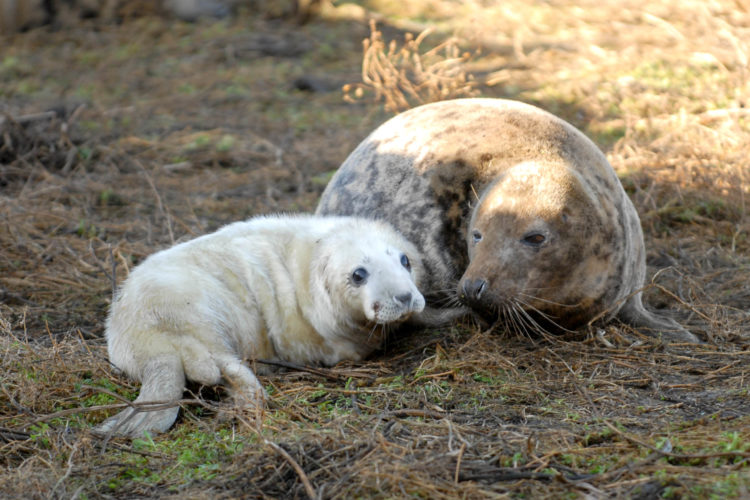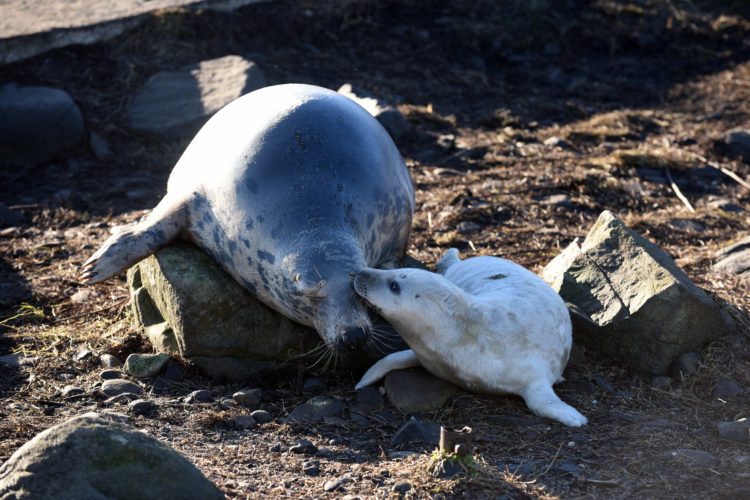
Scientists at the University of St Andrews have, for the first time, shown that grey seal pups with naturally high oxytocin levels gain more mass before weaning, without increasing the amount they are fed.
The new research, led by Dr Kelly Robinson, a research fellow at the Sea Mammal Research Unit (SMRU) at the University of St Andrews and funded by the Natural Environment Research Council (NERC), published in the journal Psychoneuroendocrinology, reveals that seal mothers with high oxytocin levels produced pups with high oxytocin levels and, as the pup's oxytocin levels increased, so did the rate that the pups gained mass.
The hormone oxytocin occurs in all mammals, and controls parental and social bonding and behaviour. Oxytocin is well known for its crucial role in social behaviours, but it can also affect energy balance and feeding. This study demonstrated that these two areas of the hormone's functionality are connected in natural environments for the first time. This helps scientists understand how the physiology and behaviour of mothers and infants are linked, promoting the health and survival of both.

Steady mass gain postpartum is crucial for successful infant development and survival in all animal species. The recorded increase in mass gain rate in the seal pups was not caused by differences in feeding behaviour and the mothers of high oxytocin pups did not have to expend more energy to cause this difference in physical development.
The study was conducted on two breeding colonies off the coast of Scotland, North Rona and the Isle of May, where Dr Robinson collected behavioural observations, mass measurements and blood samples from wild mother-pup pairs in their natural environment.
Dr Robinson said: "Infancy is a crucial time for growth and development, and this study connects the oxytocin driven mechanisms for parent-infant bonding with the energetics underlying parental care. By demonstrating that oxytocin release may connect optimal parental or social environments with advantages for physical infant development, we can help understand why some infants can sadly fail to thrive while they are very young. Studying this mechanism could also aid the development of medical interventions and animal husbandry practises to help mother-infant pairs develop strong bonds and encourage mass gain in young infants during this important stage of life."
The paper High oxytocin infants gain more mass with no additional maternal energetic costs in wild grey seals (Halichoerus grypus) is published the journal Psychoneuroendocrinology and is available online for free for 50 days.
Please ensure that the paper's DOI (doi.org/10.1016/j.psyneuen.2019.104423) is included in all online stories and the journal Psychoneuroendocrinology is credited as the source.
The Sea Mammal Research Unit (SMRU)
The Sea Mammal Research Unit (SMRU) was established in 1978 by the Natural Environment Research Council (NERC). Originally based in Cambridge, SMRU moved to the University of St Andrews in 1996 and is now part of the Scottish Oceans Institute (SOI), where it functions as an independent research group and a NERC National Capability Delivery Partner under the auspices of the NERC National Oceanography Centre.
Under its Royal Charter, NERC is required to supply advice to the UK Government on matters relating to the management of seals in the UK and its sovereign waters. In addition, SMRU is a member of the Marine Alliance for Science and Technology for Scotland (MASTS), a consortium of organisations engaged in marine science.
As a research group within the University of St Andrews' School of Biology its staff and students carry out a range of fundamental and applied studies into the biology, ecology, physiology and behaviour of marine mammals throughout the world.
With over 40 staff and students, SMRU represents a formidable concentration of expertise and talent in the field of marine mammalogy and, more generally, in marine ecology. In recognition of the world-leading role played by our researchers in furthering our understanding and protection of the oceans, SMRU was awarded the Queen's Anniversary Prize in 2011.
All photos credit: Dr Kelly Robinson, University of St Andrews






